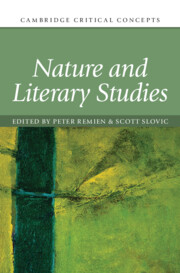Book contents
- Nature and Literary Studies
- Cambridge Critical Concepts
- Nature and Literary Studies
- Copyright page
- Dedication
- Contents
- Figures
- Contributors
- Acknowledgments
- Introduction
- Part I Origins
- Part II Development
- Part III Applications
- Chapter 14 Nature, Gender, Sexuality
- Chapter 15 Nature and Race
- Chapter 16 The Nature of Animality
- Chapter 17 Cultivating Nature
- Chapter 18 Narrating Nature
- Chapter 19 Digital Nature
- Chapter 20 Toxic Nature
- Chapter 21 Messages from Within
- Further Reading
- Index
Chapter 21 - Messages from Within
Primo Levi, Biosemiotics, and Freedom*
from Part III - Applications
Published online by Cambridge University Press: 22 July 2022
- Nature and Literary Studies
- Cambridge Critical Concepts
- Nature and Literary Studies
- Copyright page
- Dedication
- Contents
- Figures
- Contributors
- Acknowledgments
- Introduction
- Part I Origins
- Part II Development
- Part III Applications
- Chapter 14 Nature, Gender, Sexuality
- Chapter 15 Nature and Race
- Chapter 16 The Nature of Animality
- Chapter 17 Cultivating Nature
- Chapter 18 Narrating Nature
- Chapter 19 Digital Nature
- Chapter 20 Toxic Nature
- Chapter 21 Messages from Within
- Further Reading
- Index
Summary
In the book’s final chapter, “Messages from Within,” Serenella Iovino analyzes the work of the Italian writer Primo Levi, particularly the short story “Man’s Friend,” which imagines a genetic poetics produced by a tapeworm infestation. Iovino then uses the story to explore the emergent field of biosemiotics. The chapter traces a genealogy of biosemiotics in the work of Charles Sanders Peirce, Jakob von Uexküll, Denis Noble, and Wendy Wheeler (to whom the chapter is dedicated). Iovino also connects Levi’s writing to his experience as a prisoner in a Nazi concentration camp – a dehumanizing experience that deprived him of his freedom as well as his ability to communicate. Framing the chapter within reflections on the novel coronavirus pandemic, Iovino posits semiotic freedom as a fundamental imperative of all life.
- Type
- Chapter
- Information
- Nature and Literary Studies , pp. 372 - 390Publisher: Cambridge University PressPrint publication year: 2022
- 1
- Cited by

